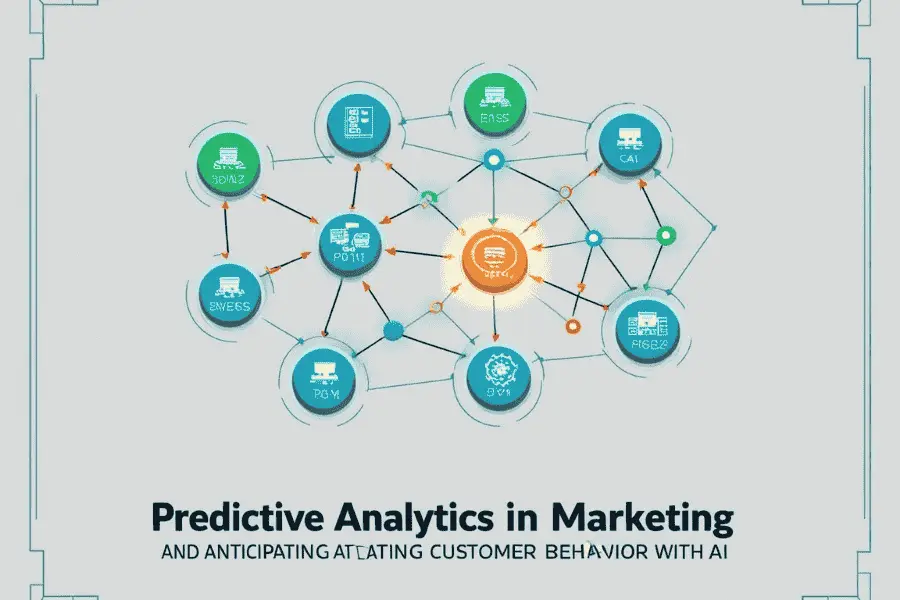Predictive Analytics in Marketing and Anticipating Customer Behavior with AI
In the rapidly evolving landscape of marketing, understanding customer behavior is crucial for success. Predictive analytics, powered by advanced technologies such as artificial intelligence (AI), has emerged as a vital tool for businesses aiming to anticipate customer needs and preferences. This approach enables marketers to not only analyze historical data but also to forecast future trends, resulting in more effective marketing strategies and improved customer engagement.

Understanding Predictive Analytics
Generative AI tools like ChatGPT automate the content creation process, significantly speeding up the generation of marketing materials. These tools can produce a wide variety of content types, including blog posts, social media updates, email campaigns, and ad copy. By inputting specific prompts or guidelines, marketers can quickly generate high-quality drafts and ideas, reducing the time and effort required for content creation.
Predictive analytics involves the use of statistical algorithms and machine learning techniques to analyze historical data and identify patterns that can predict future outcomes. In marketing, this means leveraging data from various sources—such as sales records, customer interactions, social media activity, and demographic information—to gain insights into customer behavior. By analyzing this data, businesses can make informed decisions that enhance their marketing efforts.
The Role of AI in Predictive Analytics
AI plays a crucial role in enhancing predictive analytics by processing large volumes of data more efficiently than traditional methods. Machine learning algorithms can adapt and improve over time, learning from new data inputs to refine their predictions. This capability allows businesses to stay ahead of market trends and respond proactively to changing customer behaviors.
For instance, ChatGPT can create customised email campaigns or product recommendations based on specific user profiles, enhancing engagement and conversion rates. This level of personalization helps marketers deliver more relevant and compelling messages, improving the overall effectiveness of their campaigns.
3. Enhanced Creativity and Ideation
Generative AI tools can act as creative collaborators, providing fresh ideas and perspectives that marketers might not have considered. By generating content suggestions, brainstorming new concepts, or providing variations of existing content, AI tools help marketers explore creative possibilities and overcome writer’s block.
For example, ChatGPT can assist in brainstorming content topics, suggesting catchy headlines, or providing creative angles for storytelling. This collaborative approach expands the creative process and helps marketers produce innovative and engaging content.
4. Consistency and Quality Control
Maintaining consistency and quality across various marketing channels is crucial for brand identity. Generative AI tools ensure that content adheres to predefined guidelines and brand voice, helping to maintain a unified tone and style across all marketing materials.
ChatGPT can be configured to follow specific style guides and tone requirements, ensuring that generated content aligns with the brand’s messaging and standards. This consistency enhances brand recognition and builds trust with the audience.
5. Data-Driven Insights
Generative AI tools can analyse large volumes of data to generate content that aligns with current trends and audience preferences. By leveraging data insights, AI tools help marketers create content that is more likely to resonate with their target audience.
For instance, ChatGPT can analyse popular keywords, trending topics, and user engagement metrics to inform content creation strategies. This data-driven approach enables marketers to produce content that is relevant and timely, improving its impact and effectiveness.
6. Cost-Effectiveness
The automation of content creation through generative AI tools can lead to significant cost savings. By reducing the need for extensive human resources and minimising the time spent on content generation, businesses can allocate resources more efficiently and focus on strategic activities.
For example, instead of hiring additional content writers or agencies, marketers can use ChatGPT to handle routine content tasks, allowing their teams to concentrate on higher-value activities such as strategy development and creative direction.
Generative AI tools, like ChatGPT, are transforming content creation in marketing by offering efficient content generation, enhanced personalization, creative collaboration, consistency, data-driven insights, and cost-effectiveness. These advancements enable marketers to produce high-quality, engaging content quickly and at scale, driving more effective marketing campaigns and better connecting with their audience. As AI technology continues to evolve, its impact on content creation will likely expand, offering even more opportunities for innovation and efficiency in the marketing field.
Active Events
From Insights to Impact: Proven B2B Marketing Strategies for Scalable Success
Date: Aug 08, 2025 | 7:00 PM(IST)
7:00 PM(IST) - 8:10 PM(IST)
2811 people have registered
3 Must Have Projects On your CV to Get into Data Analysis
Date: Aug 05, 2025 | 7:00 PM(IST)
7:00 PM(IST) - 8:10 PM(IST)
2753 people have registered
Bootcamps
Digital Marketing Bootcamp
- Duration:4 Months
- Start Date:Aug 09, 2025
Data Science Bootcamp
- Duration:4 Months
- Start Date:Aug 09, 2025
